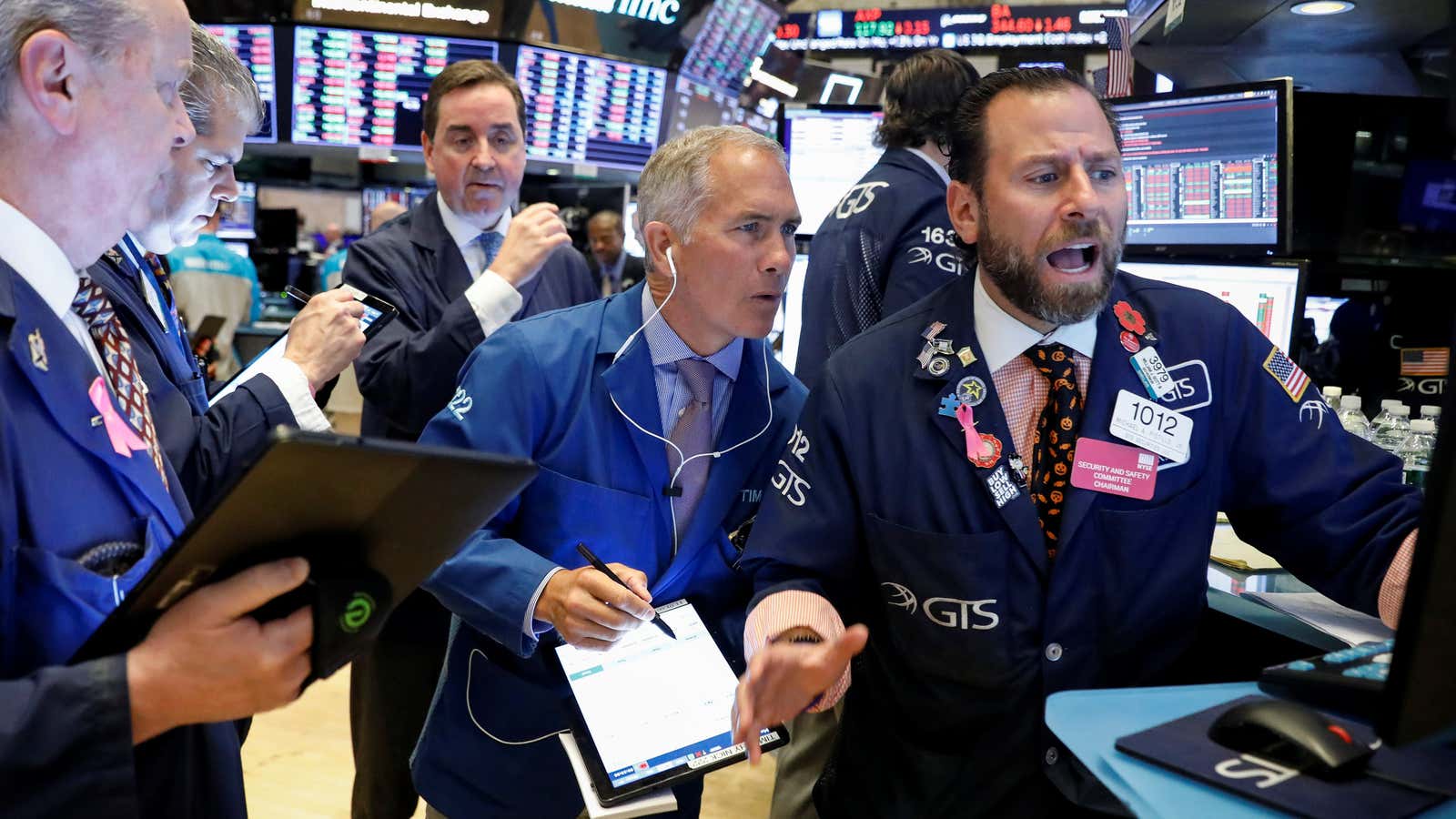As US business spending tanks and residential investment fizzles, one bulwark against recession remains: the American consumer. That’s why economists are glued to data on hiring, wages, and interest rates—they’re traditional gauges of consumer wellbeing.
But contrary to common belief, the stock market could wind up being just as important.
It’s a truism that the stock market isn’t the real economy, that the swings in share prices might affect investors but have little bearing on the fortunes of ordinary folk. And, indeed, if the market drops many American consumers won’t feel it: nearly 50% of families don’t own any shares at all. Therefore, the thinking goes, swooning share prices won’t have much effect on overall consumer spending either.
But there’s a catch. People who own stocks also tend to be wealthier. Their median income is about $90,000, compared with $45,000 among Americans who don’t hold any shares.
And when it comes to consumer spending, the rich “punch way bigger than their weight,” says Tobias Levkovich, chief equity strategist at Citi. The top 20% of highest-earning households account for nearly 40% of consumer spending, he notes, and maybe as much as half of discretionary spending.
Mind you, this isn’t because they buy more stuff. “It’s not that the top 20% are all Imelda Marcoses and they own 3,000 shoes,” says Levkovich. “But they own better shoes.” And since those better shoes are more expensive, their purchases boost top earners’ share of consumer spending.
The thing is, stocks are a big part of what makes rich people rich. That means share prices may have a much more direct link to the risk of a downturn than the conventional wisdom suggests, says Levkovich. “As far as thinking about the recession goes, the role of the stock market is potentially more important than people expect, in how it affects that top 20% who are really, really important consumers,” he says.
That is, just as the bottom half of earners are relatively insulated from a stock market plunge, top-earning families are unusually vulnerable. As their brokerage account balances start to dwindle, their willingness to spend will likely weaken, too—hitting consumption unexpectedly hard.
This channel—what economists call the wealth effect—isn’t the only way financial markets might hit the economy. Plummeting stock prices could also drag down already feeble levels of business investment. If that’s accompanied by a bond selloff, financial conditions could tighten, squeezing companies that have borrowed heavily.
“If either rates rise because people repudiate negative yielding bonds and/or stocks fall, the ripple effect could be profound both in terms of financing companies and the wealth effect impact on higher income people that own stocks,” says Peter Boockvar, chief investment officer at Bleakley Advisory Group, a New Jersey-based investment firm.
This potential vulnerability reflects a larger phenomenon: that US economic growth increasingly relies on rising prices of financial assets, supported by cheap borrowing, and not on productive economic activity. History has some ugly lessons about what happens when asset prices finally slide.
“With US net worth as a percent of disposable income at almost 700%, a record high and well above where it was in 2007 and 2000, the US economy is extraordinarily asset-price dependent,” says Boockvar. “And the last two recessions were driven by a decline in asset prices. Tech stocks collapsed and led to a sharp drop in capital spending and we know what happened after home prices fell.”
That’s not to say that a recession is around the corner, or that a bear market looms. On the contrary, US markets just hit new highs, buoyed by news of a possible US-China trade deal that would roll back tariffs.
Mind you, this isn’t obviously a symptom of the lavish risk-taking that tends to precede collapse; investors continue to hold trillions on the sidelines and in “safe havens” like low-yielding bonds. Then again, this also highlights how skittish investors are, particularly when it comes to gloomy news about the trade war. And thanks to the the twin imbalances of US consumer clout and financial wealth holdings, the economic effects of a big selloff could prove very real indeed.
